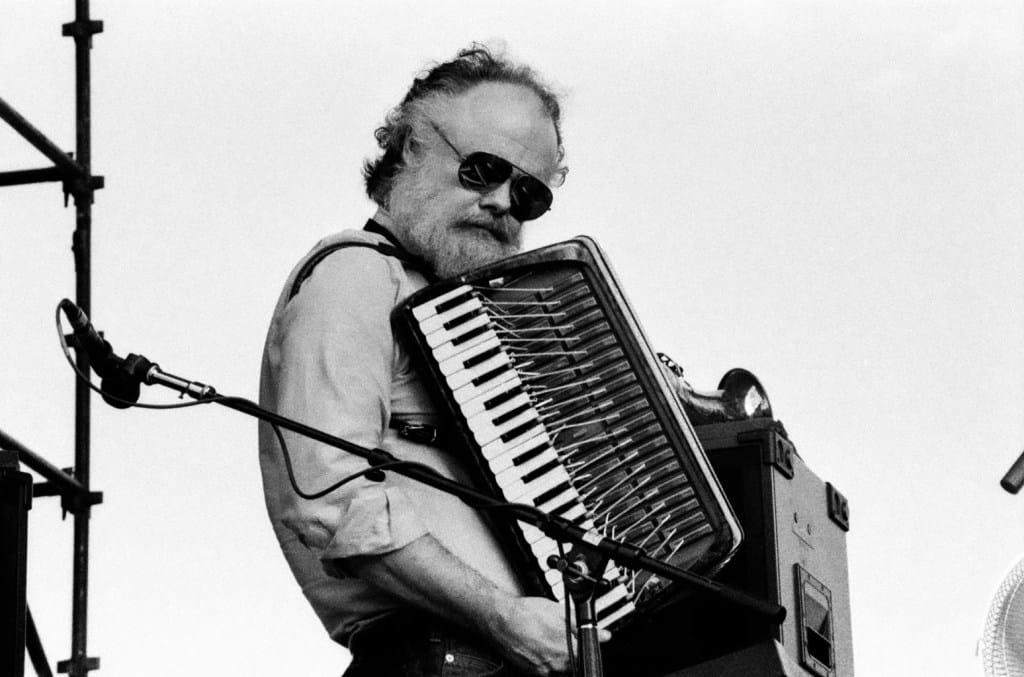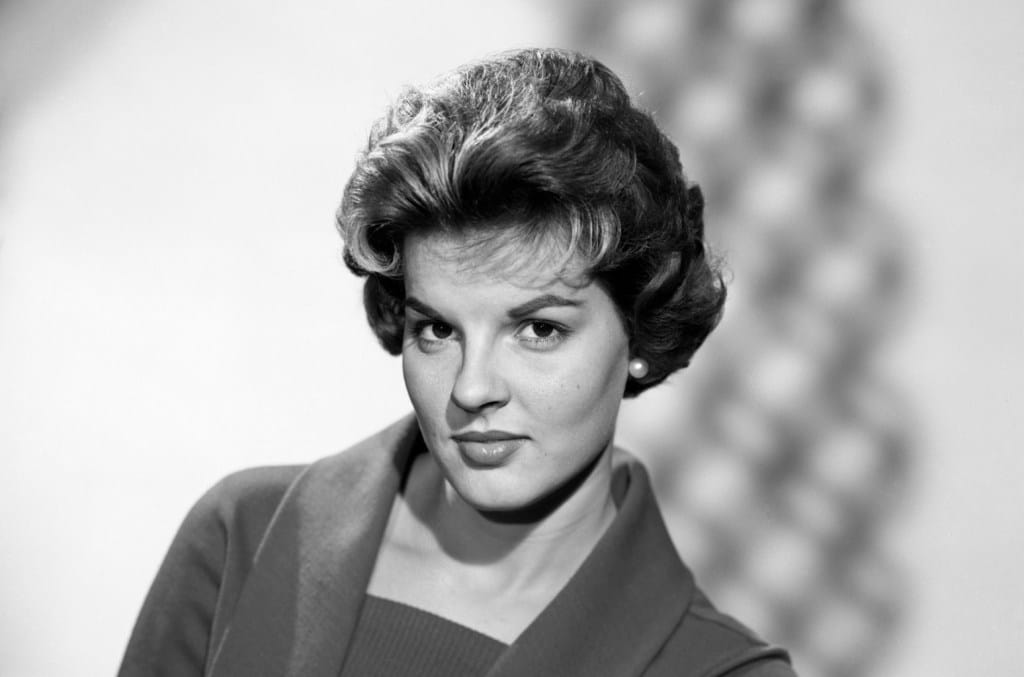obituary
Page: 8
Marianne Faithfull, British singer, songwriter, actress and iconic figure of the 1960s, has died. She was 78 years old.“It is with deep sadness that we announce the death of the singer, songwriter and actress Marianne Faithfull,” a statement shared to BBC reads. “Marianne passed away peacefully in London today, in the company of her loving family. She will be dearly missed.”
A cause of death has yet to be revealed.
Explore
Explore
See latest videos, charts and news
See latest videos, charts and news
Faithfull was born in the Hampstead area of North London, the daughter of an Austrian aristocrat and a British intelligence officer. Starting a career as a folk singer in the early ’60s, she made the acquaintance of Rolling Stones producer Andrew Loog Oldham, who introduced her to the band’s circle, and offered her “As Tears Go By,” a composition co-penned by the band’s Mick Jagger and Keith Richards. The sparse, acoustic ballad hit the top 10 in the U.K. in 1964, and also crossed over to the Billboard Hot 100, peaking at No. 22.
[embedded content]
“As Tears Go By” made Faithfull a star, and further hits followed the next year: “Come and Stay With Me,” “This Little Bird” and “Summer Nights,” all of which hit the U.K. top 10 and the Hot 100 top 40. Faithfull also became a British tabloid fixture, particularly after she began an affair with Jagger in 1966, ultimately leaving her first husband John Dunbar to live wth him. Early the next year, she made headlines for being at the scene of a drug bust at Richards’ house, dressed only in a fur rug at the time of the arrest.
The hits dried up for Faithfull in the late ’60s, but she continued to be a pop/rock presence, singing backing vocals on The Beatles’ No. 2 hit “Yellow Submarine” and co-writing the Rolling Stones’ Sticky Fingers classic drug ballad “Sister Morphine.” However, her drug addiction ended up consuming much of what should have been her prime years, particularly after she split with Jagger and lost custody of her son Nicholas (with first husband Dunbar) in 1970. After 1967’s Love in a Mist album — her last on Decca Records — she would not release another album until 1976.
Faithfull would make her first and most resounding comeback in 1979, with the new wave and disco-influenced Broken English set. The singer/songwriter’s voice had transformed into something lower and more weathered with her drug usage, and the set drew rave reviews for its modern sounds and brittle energy. Substance abuse sapped the momentum the Grammy-nominated set earned Faithfull’s career, until a 1987 reinvention as a jazz and blues singer on her Strange Weather set.
She was a sporadic presence in the mainstream for the rest of the 20th century, with high-profile guest roles on Roger Waters of Pink Floyd’s 1990 live tour of his band’s best-selling The Wall set, and as a featured vocalist on Metallica’s 1997 single “The Memory Remains.” She experienced another critical resurgence in the early 21st century with 2002’s Kissin Time set — including songs written by popular alt-rock figures Beck, Blur and Billy Corgan of Smashing Pumpkins — and released further albums of originals and covers for the next two decades, most recently with 2018’s Negative Capability, her highest-charting set on the U.K. albums chart since 1965, and 2021’s She Walks in Beauty alongside Australian composer Warren Ellis.
[embedded content]
Outside of her recording career, Faithfull also had a successful run as an actress, appearing in theatrical roles on the stage, in television and in film. She holds the distinction of being the first person to ever say the word “f–k” in a mainstream movie, doing so in the 1967 Michael Winner film I’ll Never Forget What’s’isname, and had small 21st century rules in the hit British sitcom Absolutely Fabulous (as God), and in the Sofia Coppola-directed biopic Marie Antoinette (as Empress Maria Theresa). For her starring role in 2007’s Irina Palm, as a 60-year-old widow who becomes a sex worker out of necessity, she was nominated for a European Film Award for best actress.
Faithfull also endures as one of the defining popular figures of ’60s Swinging London, iconic for her voice and her fashion, and for being a muse to many of the musicians in her orbit, primarily of course The Rolling Stones. She was ranked 25th in VH1’s 1999 list of the Greatest Women of Rock and Roll, and in 2009, she was named icon of the year at the U.K.-based Q Awards. “‘I’m glad you can hear the experience in my voice,” she told Time Out New York in 2016. “I should think so, after 50 years.”
Two days after the death of DJ Unk, the Atlanta rapper behind the 2006 snap hit “Walk It Out,” his wife has revealed the cause of his passing.
Sherkita Long-Platt, DJ Unk’s widow, confirmed on Friday (Jan. 24) that the rapper had died at the age of 43. In a heartfelt Facebook post, she wrote, “Please respect me and my family. I just lost my husband and my kids just lost their father. Our life will never be the same. I LOVE YOU ANTHONY FOREVER,” without disclosing the cause of death.
On Sunday (Jan. 26), Long-Platt shared with TMZ that her husband passed away in his sleep after suffering a cardiac arrest. She also addressed rumors circulating about DJ Unk’s possible involvement with substance abuse, clarifying that he had not struggled with drugs.
TMZ reports that a candlelight vigil for DJ Unk is planned for Sunday evening in his Atlanta neighborhood.
Trending on Billboard
Born Anthony Leonard Platt, DJ Unk was part of the Southern Style DJs before signing with Big Oomp Records in 2000. He made his debut with the single “Walk It Out” in August 2006, months ahead of his first album, Beat’n Down Yo Block!, which reached No. 21 on the Top R&B/Hip-Hop Albums chart. “Walk It Out” peaked at No. 10 on the Billboard Hot 100 and No. 2 on both Hot Rap Songs and Hot R&B/Hip-Hop Songs.
“I’m glad that it’s good energy and good vibes in the song ’cause they use it as far as work out dances, they use it in church, they use it for anything,” DJ Unk told Billboard at the 2023 BET Awards.
He also expressed his gratitude for André 3000’s verse on the remix of “Walk It Out,” which featured OutKast and Jim Jones. “I still can’t believe that to this day,” he said. “I never dreamed that he would get on a record like that because he’s so powerful as far as hip-hop and music and everything, so it’s a blessing. That was a dream come true. It was like doing a song with Michael Jackson.”
DJ Unk’s second single, “2Step,” from Beat’n Down Yo Block!, reached No. 24 on the Hot 100 and landed in the top 10 on both Hot Rap Songs and Hot R&B/Hip-Hop Songs. The success of those tracks solidified DJ Unk as a leader of the snap subgenre of Southern hip-hop. His second album, 2econd Season, released in 2008, peaked at No. 15 on the Top R&B/Hip-Hop Albums chart.
More recently, GloRilla’s 2024 debut album, Glorious, features a sample of DJ Unk’s “Hold on Ho” from Beat’n Down Yo Block!
DJ Unk, the Atlanta rapper behind the 2006 snap smash “Walk It Out,” has died at age 43, his family shared on social media Friday (Jan. 24).
The cause of death has not been publicly revealed. His wife Sherkita Long-Platt wrote on Facebook, “Please respect me and my family. I just lost my husband and my kids just lost their father. Our life will never be the same. I LOVE YOU ANTHONY FOREVER.”
Korey “Big Oomp” Roberson, who signed DJ Unk to his first label deal 25 years ago, confirmed his passing in a statement to The Atlanta Journal-Constitution. “DJ Unk was not just a legendary DJ, rapper, and producer, but a true cornerstone of our label, and the imprint that he left globally will be cherished forever,” he wrote, which was also shared on Big Oomp Records’ Instagram account. “Hit songs such as ‘Walk It Out’ and ‘2 Step’ have left an indelible mark on the industry, and his legacy will continue to inspire artists, DJs, and fans alike for years to come. His energy, creativity, and commitment to the craft will never be forgotten.”
Born Anthony Leonard Platt, he joined the DJ crew, the Southern Style DJs, before signing to Big Oomp Records in 2000. DJ Unk released his debut single “Walk It Out” in August 2006, months ahead of his debut album Beat’n Down Yo Block! that reached No. 21 on Top R&B/Hip-Hop Albums. “Walk It Out” hit No. 10 on the Billboard Hot 100 and No. 2 on Hot Rap Songs and Hot R&B/Hip-Hop Songs.
Trending on Billboard
“I’m glad that it’s good energy and good vibes in the song ’cause they use it as far as work out dances, they use it in church, they use it for anything,” he told Billboard while on the red carpet of the 2023 BET Awards. He also praised André 3000’s verse on the “Walk It Out” remix, featuring OutKast and Jim Jones. “I still can’t believe that to this day,” he said. “I never dreamed that he would get on a record like that because he’s so powerful as far as hip-hop and music and everything, so it’s a blessing. That was a dream come true. It was like doing a song with Michael Jackson.”
“2Step,” the second single from Beat’n Down Yo Block!, reached No. 24 on the Hot 100 and hit the top 10 of Hot Rap Songs and Hot R&B/Hip-Hop Songs. These songs solidified DJ Unk as a leader of the snap subgenre of Southern hip-hop. He released his sophomore album 2econd Season in 2008, which peaked at No. 15 on Top R&B/Hip-Hop Albums.
GloRilla’s “Hollon” single from her 2024 debut album Glorious samples DJ Unk’s “Hold On Ho” from Beat’n Down Yo Block!.
Longtime booking agent Scott Pang passed away on Thursday (Jan. 23) after suffering from a cardiac arrest. He was 69 years old. “He loved what he did and he was always on the phone,” his son Thompson Pang tells Billboard. “He knew so many people, it was crazy.” Pang was born in Honolulu, Hawaii on […]
Garth Hudson, the inventive keyboard player whose soulful playing was a key part of 1960s/70s Rock and Roll Hall of Fame group The Band‘s country-tinged Americana anthems has died at 87. The last surviving member of the group, Hudson died peacefully in his sleep on Tuesday morning (Jan. 21) at a nursing home in Woodstock, N.Y., according to the Toronto Star.
Along with fellow Canadians Robbie Robertson (guitar/vocals), Rick Danko (bass/vocals) and Richard Manuel (piano/vocals) and lone American member, drummer/singer Levon Helm, Hudson was a key component of the unique sound the band explored during its initial 20-year run.
Trending on Billboard
He officially began playing with The Band in 1965, after they had served a two-year apprenticeship as the back-up group for rockabilly singer Ronnie Hawkins. The Hawks — as they were known — left Hawkins’ employ in 1963 after years on the road honing their sound. After meeting Bob Dylan in 1965, the group recorded the song “Can You Please Crawl Out Your Window” the next year for what would become Dylan’s beloved 1966 double album, Blonde on Blonde, which featured such classics as “Rainy Day Women #12 & 35,” “Visions of Johanna,” “I Want You” and “Just Like a Woman.”
Dylan toured with The Band as his backing group in 1966 and then joined him in the studio for a series of 1967 sessions that became The Basement Tapes. The fruit of those sessions recorded at the group’s legendary Saugerties, N.Y. home known as Big Pink, were not officially released until 1975. That home was the inspiration for the title of the Band’s 1968 debut album, Music From Big Pink, which spotlighted Hudson’s churchy organ playing on such earthy anthems as “Tears of Rage” and what is perhaps the group’s most well-known song, “The Weight.”
For those who saw the Timothée Chalamet Dylan biopic, A Complete Unknown — which (spoiler alert) ends after the folk icon burns his bridges by going electric at the 1965 Newport Folk Festival — it’s instructive to note that The Band served as Dylan’s backup group on his first official electric tour later that year.
Though they performed at the Woodstock Festival in 1969 — which took place about 90 minutes from Big Pink — they were not included in the final film due to legal issues. The rustic, black and white cover of their eponymous next album from 1969 was a visual metaphor for their rich, throwback sound, which incorporated dusty barroom laments, aching rock odes and urgent country balladry for a mash-up roping in rock, country and classic R&B. It was all anchored by a gritty, hand-made, sepia-toned quality that served as an antidote to the more expansive, paisley-colored psychedelic experimentation and bombast of the era.
Classically trained pianist Eric Garth Hudson was born in Windsor, Ontario on August 2, 1937 and played organ in his church (and at his uncle’s funeral home) as a young man as well as studying music at the University of Western Ontario in the early 1950s before dropping out to join the rock group the Silhouettes.
Equally adept at saxophone, trumpet, violin and accordion, among other instruments, Hudson was best known for playing the two-tiered Lowery electric organ, whose distinctive, church-like sound can most famously be heard on the Bach-esque intro to the Band’s 1968 classic “Chest Fever.” That song became a highlight of the group’s shows, during which Hudson reliable performed an extended, improvised solo that roped in bits of Bach’s Toccata and Fugue in D minor on its way to stops at classical, jazz and soul.
Hudson’s oscillating, bouncing sound can also famously be heard on another of the band’s most well-known tunes, “Up on Cripple Creek,” from the 1969 eponymous album. On that song he played a clavinet through a wah-wah pedal, giving it a distinctive, Jews-harp-like twang; that song reached No. 25 on the Billboard Hot 100 singles chart. The group would release a handful of albums through the mid-1970s, including 1970s Stage Fright (“The Shape I’m In”) 1971’s Cahoots (”Life Is a Carnival,” “When I Paint My Masterpiece”), 1973’s cover album Moondog Matinee, as well as 1975’s Northern Lights – Southern Cross (“Ophelia,” “It Makes No Difference”) and the final LP by the original lineup, 1977’s Islands, before substance abuse and intra-band quarreling led to their split.
As a final, grand gesture, though, they set their disputes aside for one final, blow-out show dubbed The Last Waltz. The all-star show featuring guests Dylan, Eric Clapton, Neil Young, Joni Mitchell and many others, was documented by director Martin Scorsese for the live movie/album of the same name. The group would get back together in the 1980s — without key member Robertson — and released a trio of albums that did not reach the creative or critical heights of their early trio of classics.
In addition to his work on albums by Hawkins and John Hammond in his pre-Band days, Hudson could be heard on Dylan’s 1966 Blonde on Blonde album, as well as the soundtracks to Last Summer, Kent State, Raging Bull, The King of Comedy and Best Revenge. Throughout his career he was an in-demand session ace as well, recording tracks for albums by artists including: Bobby Charles, Eric Von Schmidt, Ringo Starr, Maria Muldaur, Paul Butterfield, Neko Case, the Secret Machines, Eric Clapton, Band-mates Danko and Helm, as well as Emmylou Harris, the Lemonheads, Van Morrison, Leonard Cohen, The Call, Tom Petty & the Heartbreakers, Marianne Faithfull, Camper Van Beethoven and many more.
He released his first solo album, The Sea to the North, in 2001, and followed up with 2010’s Garth Hudson Presents a Canadian Celebration of The Band. Hudson was inducted into the Canadian Juno Hall of Fame in 1989 and into the Rock and Roll Hall of Fame in 1994 and received a lifetime achievement awards from the Grammys in 2008.
Check out some of Hudson’s playing below.
John Sykes, the guitarist who performed with Thin Lizzy and Whitesnake in the 1980s — and who co-wrote several tracks on Whitesnake’s highest-charting album, including the hit “Is This Love” — has died.
Sykes passed away following a battle with cancer, a statement posted on his verified Facebook page said on Monday (Jan. 20).
“It is with great sorrow we share that John Sykes has passed away after a hard fought battle with cancer,” the message said. “He will be remembered by many as a man with exceptional musical talent but for those who didn’t know him personally, he was a thoughtful, kind, and charismatic man whose presence lit up the room. He certainly marched to the beat of his own drum and always pulled for the underdog.”
Trending on Billboard
“In his final days, he spoke of his sincere love and gratitude for his fans who stuck by him through all these years. While the impact of his loss is profound and the mood somber, we hope the light of his memory will extinguish the shadow of his absence,” the note read.
“Just heard the shocking news of John’s passing…My sincere condolences to his family, friends & fans,” Whitesnake’s David Coverdale wrote Monday on X, where he posted photos in tribute to his former bandmate.
Born in Reading, England, in 1959, Sykes took up guitar when he was a teenager. He joined the band Streetfighter, and then Tygers of Pan Tang, but left the band in 1982 before recording his first solo single.
Sykes co-wrote and recorded his 1982 single “Please Don’t Leave Me” with Thin Lizzy’s Phil Lynott. He later joined Thin Lizzy as guitarist and played on the Irish rockers’ final studio album, 1983’s Thunder and Lightning, for which he co-wrote the track “Cold Sweat.” “It was a little heavier and I think that was something that I’d brought to the table,” he recalled of the sound of the album in a 2008 interview.
“I was young and what I lived for was being involved in rock ‘n’ roll,” said Sykes, who’d been a fan of Thin Lizzy before joining. “That was a wonderful time in my life, and I was only about 22 years old at the time.”
He added that Thin Lizzy’s 1983 split, following a tour billed as a farewell run, was “definitely a kick to the guts. I didn’t really think it was going to end and I don’t think Phil really thought it was going to end either.”
Sykes linked with Whitesnake to record new guitar parts for the U.S. version of the group’s 1984 album Slide It In, and for their next studio album, their self-titled set that was released in 1987.
It turned out to be Whitesnake’s biggest chart success. Whitesnake the album peaked at No. 2 on the Billboard 200 that year, ultimately spending a total of 76 weeks on the chart.
The single “Is This Love,” co-written by Whitesnake’s Coverdale and Sykes, reached No. 2 on the Billboard Hot 100 songs chart in 1987. It was the second biggest chart hit off of Whitesnake’s self-titled album, just behind “Here I Go Again” (co-written by Coverdale and Bernie Marsden), which made it to No. 1 on the Hot 100. Both singles were preceded by “Still of the Night” (another Coverdale/Sykes work), a song that only ranked at No. 79 on the Hot 100 but reached the MTV audience with its Marty Callner-directed music video — but Sykes isn’t in the video.
Though Sykes was a co-writer on the majority of the album’s tracks, it would be the last Whitesnake project he contributed to before Coverdale unexpectedly fired him, and his bandmates, ahead of the record’s release.
“As you know, things went squirrely between us, which was unfortunate,” Coverdale said in an interview with Metal Edge in 2023. “But John was and is an incredible talent. Our musical chemistry was great, but it didn’t work personally.”
Sykes shared his version of what happened in a 2017 interview with Rock Candy, saying in part, “David said nothing to any of us about having decided to kick us out of the band,” and that he had found out about it from John Kalodner, then A&R at Geffen Records.
But Sykes continued on his path in music. Following his time with Whitesnake, he formed the band Blue Murder, releasing two studio albums and one live album in the early ’90s. His career later shifted to a focus on solo work, with five albums to come over the timespan of 1995-2004.
2004’s Bad Boy Live! was his last full-length album released before his death.
In 2021, Sykes released two singles, “Dawning of a Brand New Day” and “Out Alive.”
David Lynch, the beloved filmmaker and director known for his dark, surrealist vision in the television classic Twin Peaks, as well as films including Mulholland Drive and Blue Velvet, has died. He was 78 years old.
Explore
Explore
See latest videos, charts and news
See latest videos, charts and news
Lynch’s family announced the news of his passing via a Facebook post on Thursday (Jan. 16). “It is with deep regret that we, his family, announce the passing of the man and the artist, David Lynch,” the statement reads alongside a photo of the artist playing a guitar. “We would appreciate some privacy at this time. There’s a big hole in the world now that he’s no longer with us. But, as he would say, ‘Keep your eye on the donut and not on the hole.’ It’s a beautiful day with golden sunshine and blue skies all the way.”
See the post here. His cause of death was not revealed.
Trending on Billboard
Lynch’s death comes just five months after he announced that he was housebound over fears he’ll contract COVID-19 after being diagnosed with emphysema from many years of smoking. At the time, he added that he wasn’t planning to make another film. “I would try to do it remotely, if it comes to it,” Lynch said. “I wouldn’t like that so much.”
The Missoula, Montana, native, was a one-time painter who enrolled in the Pennsylvania Academy of the Fine Arts before he shifted his focus to making films. His breakthrough came via 1977’s Eraserhead, which became popular in the midnight movie underground circuit. Among his many notable films include 2001’s Mulholland Drive starring Justin Theroux, Naomi Watts and Laura Harring; and 1986’s Blue Velvet, starring Kyle MacLachlan, Isabella Rossellini, Dennis Hopper and Laura Dern.
In television, he was best known as the visionary behind the mystery drama series Twin Peaks, which ran for two seasons from 1990 to 1991 and returned for a third season in 2017. The series won three Golden Globes and two Emmys, as well as a 1991 Grammy for best pop instrumental performance for the Angelo Badalamenti-composed theme music.
Lynch’s projects also made appearances on the Billboard charts. Twin Peaks: Music From The Second Season And More claimed the No. 17 spot on the the April 27, 2019-dated Soundtracks chart. That same week, it peaked at No. 68 on the Top Album Sales tally. His third studio album, The Big Dream, peaked at No. 40 on Independent Albums and No. 167 on Top Current Album Sales in 2013.
He also directed a number of music videos, including Nine Inch Nails’ 2013 “Came Back Haunted” clip as well as Moby’s 2009 “Shot in the Back of the Head” video.
Buck White, the patriarch of country and bluegrass music group The Whites, died Monday, Jan. 13 at age 94.
White’s daughters Sharon, Cheryl, Rosie and Melissa said in a statement: “The Lord answered our prayers and took our daddy home peacefully this morning at 8:00 a.m. We are so thankful for his 94 years on this earth. He was a great Dad who taught us by example to put Jesus first always. His great loves were the Lord, our mother, his family and music. Most people will remember him not only for being a great musician and entertainer, but also for being fun-loving and full of mischief. He lived a full life and finished well.”
White was born Dec. 13, 1930. According to The Whites’ Skaggs Family Records bio, White launched his music career by playing mandolin and piano in dance halls and radio shows around Texas. He later relocated his family to Arkansas in the 1960s. The group initially formed as Buck White & the Down Home Folks, and as White’s daughters Sharon and Cheryl began displaying their own talents for music, they joined the group.
Explore
Explore
See latest videos, charts and news
See latest videos, charts and news
In 1971, they performed at Bill Monroe’s Bean Blossom festival, which prompted the group to move to Nashville and further pursue a career in music. Throughout the early 1970s, they continued releasing albums. Their music and familial harmonies caught the ear of Emmylou Harris, who invited the group to sing on her 1979 album Blue Kentucky Girl; they then joined Harris on the road as her opening act.
Trending on Billboard
Buck White also released the solo album More Pretty Girls Than One in 1979, while the group issued their first album under the moniker The Whites in 1983, with Old Familiar Feeling.
In the 1980s, the group earned top 10 Hot Country Songs chart hits including “You Put the Blue in Me” (which earned the group its first Grammy nomination, for best country performance by a duo or group with vocal) and “Hangin’ Around.” Sharon White married bluegrass/country artist Ricky Skaggs in 1981, and Skaggs produced the bulk of The Whites’ 1980s hits. The Whites and Skaggs also began performing often together, with Skaggs introducing the group to new audiences. The Whites became members of the Grand Ole Opry in 1984. The Whites also picked up CMA Awards nominations in categories including horizon award, instrumental group of the year and vocal group of the year. They released their first all-gospel album in 1988 with Doing It by the Book.
White appeared with his daughters in the 2000 film O Brother, Where Art Thou, and the country music classic “Keep on the Sunny Side” as part of the movie’s soundtrack. The group also took part in the 40-plus city Down From the Mountain Tour.
To date, The Whites have won two Grammys, earning best southern, country or bluegrass gospel album for their project Salt of the Earth (with Skaggs), and album of the year for the O Brother, Where Art Thou? soundtrack. The Country Music Association also named the soundtrack as its album of the year in 2001.
The Whites were inducted into the Texas Music Hall of Fame in 2008, and earned the International Bluegrass Music Association (IBMA)’s distinguished achievement award in 2006. They also celebrated 40 years as members of the Grand Ole Opry last March.
On the Billboard Bluegrass Albums chart dated Jan. 18, 2025, the O Brother, Where Art Thou? album re-entered the chart at No. 2.
Funeral arrangements for White are pending.
Jackie Farry, a music industry veteran who served as tour manager for Elliot Smith and the Lemonheads in the 1990s and who was Frances Bean Cobain’s first nanny, died on Sunday (Jan. 12) of complications from lung disease. Farry’s death was confirmed to The Hollywood Reporter by longtime friend manager/producer Janet Billig Rich.
Explore
Explore
See latest videos, charts and news
See latest videos, charts and news
Farry’s career began in the 1980s when she served as a receptionist at Homestead Records, a beloved New York indie label whose roster included such beloved acts as Antietam, Babe the Blue Ox, The Meatmen, Tsunami, Volcano Suns and others. She moved on to gigs at Atlantic Records (1988-1989), Epic Records (1991-1992), where she worked in radio promotion, often with hard rock and metal bands.
She pivoted to working with Nirvana during the band’s heyday, serving as nanny to singer Kurt Cobain and wife Courtney Love’s daughter, Frances Bean, until Cobain’s death in 1994. After working with a number of metal bands early in her career, she also hosted the short-lived MTV series Superock, which launched in 1995 as a replacement for the former video music channel’s beloved Headbangers Ball series.
Trending on Billboard
Later in the decade, Farry was a tour manager for a number of indie rock acts, including Stereolab, the Lemonheads, Jon Spencer Blues Explosion, Quasi and others.
According to THR, Farry was born Jacquelyn Beth Farry in New York and raised in the controversial Synanon community, which was initially established as drug rehab program before growing into a cult in which leaders allegedly controlled members using confrontational “attack therapy.”
“Jackie carried with her an incredible trove of memories and songs from those formative years,” Billig told THR. “Jackie’s love for music was matched only by her sharp wit, humor, and magnetic personality. She was a beacon for friends and strangers alike, drawing people in with her infectious energy. Jackie Farry’s legacy is one of love, laughter and an indomitable spirit. She will be deeply missed — her unforgettable stories, her humor and her impact on those who knew her will live on forever.”
Farry was diagnosed with cancer in 2003, with her many friends standing by her and organizing a series of “f–k cancer” benefit shows featuring bands including the Breeders, TV on the Radio and Guided By Voices. In honor of her longtime support of pit bull rescue, donations in Farry’s honor can be made to her charity of choice, LovePaws.
Anita Bryant, a former Miss Oklahoma, Grammy-nominated singer and prominent booster of orange juice and other products who became known over the second half of her life for her outspoken opposition to gay rights, has died. She was 84.
Bryant died Dec. 16 at her home in Edmond, Oklahoma, according to a statement posted by her family to news site The Oklahoman on Thursday. The family did not list a cause of death.
Bryant was a Barnsdall native who began singing at an early age, and was just 12 when she hosted her own local television show. She was named Miss Oklahoma in 1958 and soon began a successful recording career. Her hit singles included “Till There Was You” (from the Broadway musical The Music Man), “Paper Roses” (a top five hit on the Billboard Hot 100), and “In My Little Corner of the World” (a top 10 hit on the Hot 100). A lifelong Christian, she received two Grammy nominations for best sacred performance (for Abide With Me and “How Great Thou Art”) and one for best inspirational performance, for Anita Bryant … Naturally.
Trending on Billboard
By the late 1960s, she was among the entertainers joining Bob Hope on his USO tours for troops overseas, had sung at the White House and performed at the national conventions for both the Democrats and Republicans in 1968. She also became a highly visible commercial spokesperson, her ads for Florida orange juice featuring the tag line, “A day without orange juice is like a day without sunshine.”
But in the late 1970s, her life and career began a dramatically new path. Unhappy with the cultural changes of the time, Bryant led a successful campaign to repeal an ordinance in Florida’s Miami-Dade County that would have prohibited discrimination based on sexual orientation. Supported by the Rev. Jerry Falwell among others, Bryant and her “Save Our Children” coalition continued to oppose gay rights around the country, denouncing the “deviant lifestyle” of the gay community and calling gays “human garbage.”
Bryant became the object of much criticism in return. Activists organized boycotts against products she endorsed, designed T-shirts mocking her and named a drink for her — a variation of the screwdriver that replaced orange juice with apple juice. During an appearance in Iowa, an activist jammed a pie in her face. Her career in entertainment declined, her marriage to her first husband, Bob Green, broke up, and she later filed for bankruptcy.
In Florida, her legacy was challenged and perpetuated. The ban against sexual discrimination was restored in 1998. Tom Lander, an LGBTQ+ activist and board member of the advocacy group Safe Schools South Florida, told The Associated Press on Friday (Jan. 10), “She won the campaign, but she lost the battle in time.” But Lander also acknowledged the “parental rights” movement, which has spurred a recent wave book bannings and anti-LGBTQ+ laws in Florida led by such conservative organizations as Moms Against Liberty.
“It’s so connected to what’s happening today,” Lander said.
Bryant spent the latter part of her life in Oklahoma, where she led Anita Bryant Ministries International. Her second husband, NASA test astronaut Charles Hobson Dry, died last year. According to her family’s statement, she is survived by four children, two stepdaughters and seven grandchildren.

 State Champ Radio
State Champ Radio 







